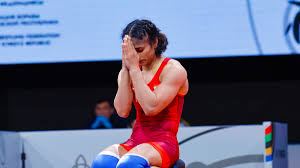The demand for a joint medal was clearly jumping the gun. It would have been more dignified for India to have stepped back and respected the rule rather than make demands to be treated differently. by KUMKUM CHADHA

As one thought that the hullabaloo about Olympian Vinesh Phogat was over, there was yet another storm that was brewing: this time on home ground.
The dust had barely settled on Phogat’s weight issue at the Olympics in Paris. Back home she was at it again, this time hitting out at the Police.
Phogat had alleged that the cops had withdrawn her security cover along with other women wrestlers.
The wrestlers were scheduled to testify against Brij Bhushan Singh, former President of the Wrestling Federation of India.
Phogat, it may be recalled, was in the forefront demanding Singh’s arrest. She, along with other wrestlers, has accused Singh of sexual harassment.
On its part, the courts directed the Delhi Police to provide security to Phogat and others.
Fighting legal battles is not new to Phogat: if at home, it is over Singh or the Police; in Paris it was about a medal.
Phogat, it may be recalled, missed a silver by a whisker, so to speak.
It all began with Phogat beating Japanese wrestler Yui Susaki.
This followed an elated Phogat to beat champion Oksana Livach to reach the finals.
At that point in time, Phogat was the first Indian woman wrestler to reach an Olympic final.
Then Disaster struck.
As per rules, Phogat was required to meet the weight requirement for the finals. Once on the machine, she was two kgs overweight.
This followed drastic measures including vigorous exercising, wearing a sauna suit to help her sweat and even drawing out blood, shortening her clothes and cutting her hair.
By the time she went back on the weighing machine it was more than half the battle won but she lost by a whisker: literally. She had cut nearly, yes nearly, all of the two kg but unfortunately fell short by a mere 100 gms.
Phogat was 100 gms above the prescribed limit in the customary morning weigh in.
This led to her disqualification from the Games. Worse still, it placed her last among the 16 competitors. It also made her ineligible for the medal.
According to Article 11 of the United World Wrestling’s rule book, an athlete who doesn’t make the permissible weight cut stands to be eliminated from the tournament.
Had Phogat entered the finals and won she would have bagged the gold. In the event of losing the finals, she was, in any case, eligible for the silver.
Smiles turned to tears and from someone who India and Indians were watching for a gold came to a naught: “I have no strength left to continue” is what she said as she announced her retirement from the sport.
Later, she appealed to the Court of Arbitration of Sports for a joint silver medal alongside Cuban wrestler Y Guzman Lopez.
After hearing both sides, the Court said it would give its decision before the end of the Games. That gave hope: Indians prayed for Vinesh Phogat and the country for silver.
The deadline passed; the Games were over and the decision deferred to a later date not once but multiple times.
Reactions to this were mixed: some saw a ray of hope in this; others said the writing on the wall was clear and the procrastination by the CAS was nothing but a bid to buy time and let things cool.
On August 14, Phogat’s plea for a joint medal was dismissed. The Court, while highlighting strict adherence to rules, said that wrestlers will have to remain below their permissible weight limit without any exceptions.
The verdict broke hearts but a rational analysis would substantiate that it could not have been different.
Therefore, what Indian goalkeeper PR Sreejesh said made a lot of sense.
The hockey legend, while empathizing with Phogat said that her case should be a lesson for Indian athletes to be strict with rules.
Citing examples of athletes being banned in the past, Sreejesh said that rules are made to make the game beautiful and controlled and sportspersons should follow: “You have Olympic rules and the Indian athletes know what is happening there and they should be ready for that”.
None could have put it better because rules are rules and are in place because they need to be followed.
Therefore, this hue and cry about being denied a silver for Phogat is much ado about nothing.
And Phogat’s case is not the only one in Olympic history.
Ironically, the one who was seen consoling her in Paris was gold medalist Rei Higuchi, who was disqualified from Tokyo Olympics for being 50 grams, yes 50 gms, overweight in men’s wrestling.
Therefore, all those shedding tears for Phogat’s loss need to stop and ask:
Aren’t we overdoing the Phogat issue? Are we bending over backwards to appease her? Did the Indian Olympic Association overstep by appealing to the Court for a joint silver?
And more importantly, shouldn’t there be a dividing line between emotion and judgement?
One’s sympathies may be with Phogat but then sympathy is not synonymous with justice.
Therefore, the demand for a joint medal was clearly jumping the gun. It would have been more dignified for India to have stepped back and respected the rule rather than make demands to be treated differently.
But then it was a damned if you do and damned if you don’t kind of a situation for the Government.
Had Singh’s case not staring it in the face, it could have remained silent. But given that background, the Government had no option but to fight for Phogat.
It is well known that the Modi Government was slammed for shielding Singh.
For starters, it was reluctant to remove him as Federation Chief. And when it did, it brought in one of its cronies.
Against this backdrop, the BJP government had no choice but to fight for Phogat’s medal and of course defend the indefensible.
And what can one say about those alleging a conspiracy theory against Phogat?
When Phogat lost her medal, critics of the Modi government alleged that she was a victim of a conspiracy.
Their take: she was made to pay for her daring of taking on Singh. Also, had she won she would be felicitated: an act which would send the Federation running for cover.
However, to even imagine that any government would barter the country’s medal to settle scores is a bit far-fetched.
Therefore, to continue crying over Phogat or with her is a bit of a stretch.
One must concede that in sports, you win some and you lose some. The true mark of a sportsperson is to handle defeat with dignity rather than demand concessions, altering rules or crying foul. On that count, Phogat fell terribly short.













